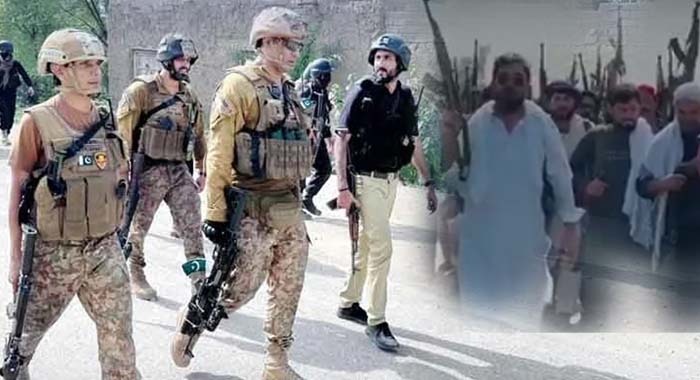Khyber Pakhtunkhwa (KP) is witnessing a quiet revolution in the fight against militancy. Across districts like Lakki Marwat, Bannu, Dera Ismail Khan (DI Khan), and Tank, and many others across Khyber Pakhtunkhwa ordinary citizens are no longer mere bystanders. They are joining hands with law enforcement, forming local peace committees, providing actionable intelligence, and in some cases, standing guard themselves. This is not a rebellion; it is a resolute partnership between the state and its people a critical development in a province long challenged by insurgency and extremism.
In Lakki Marwat, the role of Aman Committees locally organized peace groups has been particularly significant. During a recent intelligence-based operation (IBO) in Khan-Khel Mandzai, joint efforts between security forces and local volunteers led to the neutralization of three high-profile terrorists. The success of this operation was made possible not only by professional training and state resources but also by the unparalleled local knowledge and courage of these residents. Similarly, in Bannu, civilians have aided police in repelling coordinated attacks on police stations. During these incidents, locals manned checkpoints, shared intelligence, and stood shoulder to shoulder with law enforcement personnel, demonstrating that community involvement can tip the scales in counterterrorism operations.
Even DI Khan and Tank have seen residents supporting security forces by reporting suspicious activities, monitoring vulnerable routes, and providing logistical assistance. These acts, while not as visible as armed confrontations, are no less vital. They reflect a populace that refuses to cede its communities to terror networks. This collaboration between local communities and the state carries profound implications. First, it restores trust between citizens and institutions. Militants have historically thrived in the shadows of mistrust, exploiting community alienation. When residents actively support security operations, they signal that the state is not an external entity but a partner in their own protection.
Second, local participation enhances operational effectiveness. Residents know the terrain, the population, and patterns of movement in ways that even the most sophisticated state agencies cannot. Integrating this knowledge into counterterrorism operations increases the precision, speed, and impact of security measures. Third, citizen involvement imposes both moral and tactical costs on militants. Fighting against one’s own neighbors, who are committed to defending their homes and families, raises the stakes and disrupts insurgent networks’ recruitment and logistics.
Finally, this alliance conveys a moral message: the people of KP will not remain passive victims. Their courage, loyalty to the state, and determination to protect their communities demonstrate that counterterrorism is not just a state responsibility it is a shared national mission. While the bravery of local citizens is commendable, it also underscores a larger truth: the state must strengthen governance in KP. That residents feel compelled to step into the breach highlights gaps in administration, security, and local development. Decades of neglect, insufficient infrastructure, and uneven access to basic services have provided fertile ground for militancy.
The provincial and federal governments now have an opportunity to harness this momentum. Institutionalising Aman Committees through formal training, oversight, and legal frameworks can ensure accountability while maximising their contribution to security. Additionally, targeted development programs in districts such as Lakki Marwat, Bannu, DI Khan, and Tank and many other areas covering education, healthcare, and economic opportunity can reduce the socio-economic vulnerabilities that extremists exploit.
A coordinated strategy that combines military operations with political engagement, development initiatives, and community participation is essential. The goal should be sustainable security not just tactical victories, but a long-term framework in which civilians feel safe, represented, and empowered.
Citizen participation in security, while laudable, carries inherent risks. The possibility of misuse, local conflicts, or retaliatory attacks by militants cannot be ignored. The state must ensure that armed volunteers operate within a regulated framework, with clear rules of engagement and legal protections. Equally important is the protection of community leaders and volunteers. Their courage places them in direct danger, and any lapse in security could erode public trust and willingness to participate. Recognising and safeguarding these individuals is not only a moral obligation but a strategic necessity.
The current wave of grassroots resistance is a historic moment for KP. From Lakki Marwat’s Aman Committees to citizen engagement in Bannu, DI Khan, and Tank, and many other parts of KP communities are proving that counterterrorism is most effective when the state and its people act in concert. This is more than a tactical advantage; it is a foundation for a broader societal contract. By demonstrating their loyalty and courage, citizens are asserting that security is a shared responsibility. For the state, the challenge is to channel this energy into durable structures, sustainable governance, and inclusive development.
The people of Khyber Pakhtunkhwa are not merely defending their homes; they are redefining the relationship between citizens and the state. Their courage, combined with professional security operations, represents a new model of counterterrorism: one rooted in collaboration, trust, and mutual accountability. If nurtured with vision and care, this citizen-state alliance could transform KP’s security landscape, delivering not just short-term victories against militants but a lasting culture of resilience, civic responsibility, and peace. In this shared struggle, the state and its citizens are proving that when they rise together, no challenge is insurmountable.





